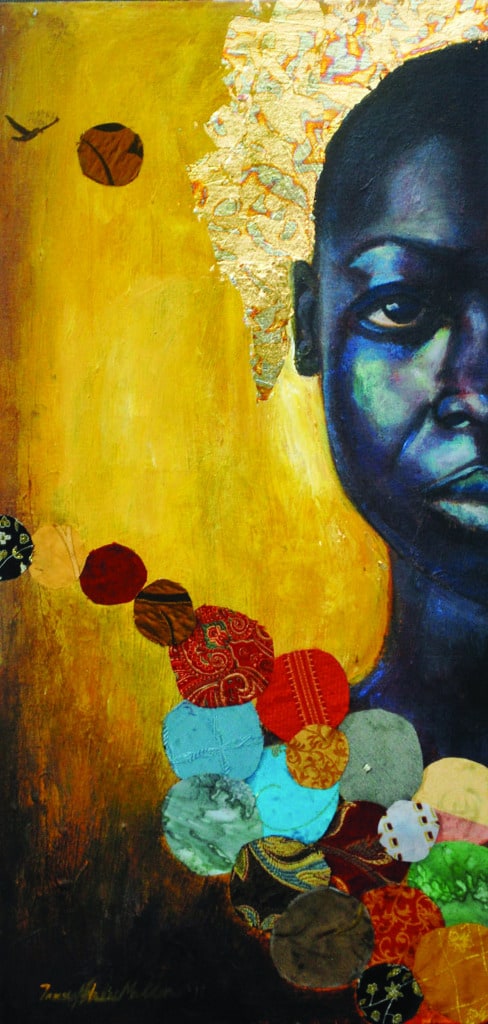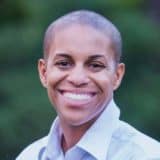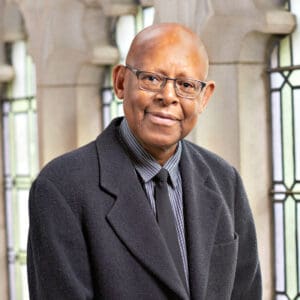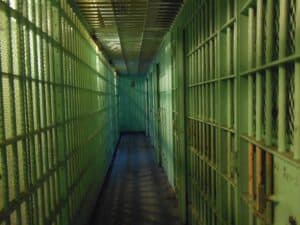
It happened in the large but very ordinary fellowship hall of my Southern church, bright with florescent lights. Long tables had been arranged in a U, the same tables that I had set up and broken down dozens of times as a church youth worker. There were 15 of us, joined by the dozens of those people each of us loved the most along with people we did not know. Pastors and church elders and Bible teachers. All of them men.
Our small group of young people had spent that summer in an intensive training course modeled on Paul’s challenge to Timothy to entrust the things he had learned from Paul to “reliable men who will also be qualified to teach others.” At the time I did not give a second thought to the fact that I was a woman who would later need to grapple with the specifics of that verse as well as the qualifications to be an elder that Paul listed in his previous letter. I considered the fact that I was black in a nearly all-white context incidental. The fact that I was gay was something I kept as far from the forefront of my mind as possible. Perhaps a part of me sensed that the words “reliable” and “qualified” would be stripped from me if others knew. In any case, I knew that being gay was sinful, and I wanted to pursue righteousness.
We had spent weeks together dedicated to exegesis and ecclesiology, prophesy and mission. I had read and memorized Scripture. I had prayed often in groups and prayed often alone. I had talked at length to a mentor. That evening in the fellowship hall a sort of informal graduation was the program’s conclusion, a public proclamation of our internal commitment. After dinner there were speeches, which I have since forgotten. But what remains clear in my heart is the sense of calling and consecration. Each of us, one at a time, was asked to come forward. A leader in our group of churches, a man who possessed the spiritual gift of prophecy, laid hands on each of us, prayed, and then proclaimed what he felt the Holy Spirit saying. It was a long process, filled with mystery and awe. When it was my turn, I went forward and waited. The man placed his hands on my forehead, prayed, and began to speak with ease things that I had been contemplating in the quietness of my heart. Then he said, “You will walk on the edge for the Lord.”
Four years later, when I was 24, I stood in front of the sanctuary at the same church on a Sunday morning. In the years since the summer program, I had been preparing myself to live overseas as a missionary. That is what I had been contemplating in the months leading up to the graduation. I had traveled widely, met Christian people of various faith stripes, and trained in West and North Africa. My heart had turned toward the desert places. I loved Isaiah’s prophecies about the barren places and parched lands and the always attendant promises of water that followed them. On that Sunday morning, I stood before the people I loved most in the world outside of my blood kin, and I told them, in Hudson Taylor fashion, that if I had 10,000 lives I would give them all for North Africa. I was leaving my church to go to graduate school and that was what I had wanted most to say. I could not have imagined how much that leaving would change everything.
The man placed his hands on my forehead, prayed, and began to speak with ease things that I had been contemplating in the quietness of my heart. Then he said, “You will walk on the edge for the Lord.”
During the first week of graduate school, one of my professors assigned the class a project and asked for volunteers to work together. My hand went up to work on a chapter about conflict in West Africa. A woman I had never noticed before also raised her hand. We exchanged information before leaving. We worked on that project and then another. And I found myself struggling with feelings for her that I knew to be inappropriate.
I had fallen in love before, each time making me more frightened and desperate. There had been years of depression, thoughts of suicide, and numbness. As a teenager, I had told people I trusted about my attraction to women, nearly as soon as my relatives’ laughter about “those people” taught me what it meant. For years I had read Christian books about how to resist temptation and change my attractions. I had sought prayer. I had even dated a boy for a time. In every sense I had been a “successful” Christian, sensing a call to full-time ministry early, working in the church, being chosen for special training. In every sense, that is, except for one. My outside did not match my inside.
I did not pursue romance with my project partner. But in an irony I still do not fully understand, I decided to be honest with her and tell her of my feelings. One question from her undid me: “Why is that so bad?” After nearly a decade of studied resistance, of fortifying myself with theology and Scripture, I realized that I could not truly answer that question. One plus one did not equal two, and that deep personal sense that something was off kilter led me back to Scripture and study and began a two-year process through which an adult love for Christ and for myself would be forged. At the end of it I would come out as a Christian and unashamedly gay woman.
Lately I have begun to take seriously the ramifications of that honest decision. I am older, and things like professional security and personal reputation have begun to matter more. I attempt to look further ahead and discern what is to come, as if some amount of planning might strengthen me. I still believe in the statements of the Apostles’ Creed and the beauty of the church and the mystery of Christian marriage. I can feel more distinctly the reality that grace has come; I sense it in my bones. I have also begun taking stock. I am not a pastor or a missionary as I had once envisioned. The decision to live fully and indivisibly as a Christian and as a gay person has been devastating in the most profoundly shattering ways and in the most furiously lovely ways.
Accepting that I am a gay woman has made me vulnerable in ways that no one would choose for themselves. A few years ago, over the course of just a few months, I read several stories about hate crimes in my city, crimes targeted at people like me, gay people or gender-nonconforming people. Knowing that they had occurred on streets that I routinely walk frightened me. One night during a phone conversation with a friend (a gay man), we discussed the logistics of the crimes and what areas of town they took place in. We discussed what could be done if we found ourselves in such a situation. It seemed that I would be more likely subject to rape, and I flatly did not know what I would do. He decided that he, like the people in the articles, might be beaten. If there were one or two of them, he said, staying on his feet would be of first importance. Falling would be the thing to avoid. If there were three of them he felt he wouldn’t really have much of a chance.
That conversation has stayed with me. Its matter-of-factness has stayed. The image of being kicked to death has stayed, too. In the weeks following Easter one year, I read about a young woman in South Africa who had been brutally raped and murdered on Easter morning—because she was gay. While I was putting on my Sunday best, she had already been killed. She was black and a woman and many more of the things that I am. That too has stayed.
For me, fear has been the main hardship of being gay. Fear of being assaulted. Fear of the wrong person at work finding out that I am gay. Fear that I will say too much at church and be alienated from the people with whom I seek the Lord. Fear that I will not say enough and thus be complicit in the intentional and unintentional silencing that happens in many places of worship. Church entails a sort of bargaining for me. Will I choose to be accepted, or will I choose to be honest?
I attend a wonderful church these days that I love. I can be honest about my sexuality there. The elders and I have an understanding. I can be honest, and in exchange I have agreed that I can never become a member or serve in any of the ministries of the church. I have agreed to this because I have such a strong sense of God’s presence there, and I feel it is, for all of the struggle, the right place for me at the moment. I carry the fear into church. Often I feel heavy with it. Then I raise my hands in worship, listen intently to hear God speaking in my pastor’s message, and mill about with my friends after church. Every Sunday I have the opportunity to let God take my fear and create something else that cannot be crafted by my own hands. Every Sunday I get to experience resurrection in a way that feels close and specific and desperately needed.
And that is just it. Any attempt I make to parse out the good and the bad of being a gay Christian woman very soon runs into problems. The fear and vulnerability, the feelings of exile, and the reality of exclusion are real. Still, even though I am no longer “reliable” and may never again be considered qualified to teach others, the sense of calling to full-time ministry has not left. The need to give my body, to take fully a missional posture, to walk on the edge for the Lord is still potent.
“Be indivisible. Your Christian world will insist that you
cannot be gay. Your gay world will view you with suspicion
because you are a Christian. You will feel the pulling
in your chest. When this happens, keep in mind that
for any part of you to survive authentically, all of you must
survive relentlessly.”
– Tonetta Landisin “Battle Hymn: A Queer Christian’s Guide to More Than Survival”
published in RAW, A Poetic Journey:
Finding a Way from Conflict to Revelation
(NuWine Press, 2011)
Perhaps I actually have a clearer opportunity than most American Christians to follow in the way of Jesus. He who was despised and rejected calls out to me clearly as I am despised and rejected. More times than I care to count, I eat with people, friends, who I know will ultimately betray me by being silent in the face of injustices against gay people. I know that they will refuse to come to my wedding even as I ask how I can pray for them. I am aware strongly of God’s upside-down kingdom where the first will be last and the last first. I remember that I am called fortunate because I do mourn and need so deeply for God’s righteous justice to become food. My calling is not to build bridges these days but rather to allow my body itself to become a bridge. My calling has become presence, mere existence in spaces where people like me aren’t supposed to stand. Evangelical spaces. I pray to lead a dying life for the sake of the kingdom, and I wait for resurrection in the very places that are still struggling to recognize that I exist.
I still love the Middle East and North Africa, but these days I think that the possibility of walking on the edge for the Lord is not nearly so distant. I remember the man who laid his hands on me and spoke those words over me more than 11 years ago. These days I think that he and I may not be so far apart, even though he likely still oversees several churches and I cannot even become a member of mine. We both desperately want to live in the tradition of the best prophets, being a sign for our generations, and we both deeply want to help build the church of the Lord Jesus Christ.
I dream simply of one day meeting LGBT people in evangelical spaces and of them being able to live indivisible lives of passion for Christ. And I dream that it will no longer be people like me on that edge alone. I pray that we would together become a people of honest questions and honest lives—walking on the edge for the Lord but always clinging to the One who makes water “gush forth in the wilderness and streams in the desert.” Clinging to the God of Resurrection.
 Tonetta Landis-Aina, a native of North Carolina, is a high school teacher and freelance writer. She is interested in issues of identity in marginalized communities in the United States as well as in the developing world. She currently resides in Washington, DC. This article won first prize in the First-Person Essay category of the 2012 Evangelical Press Association Awards.
Tonetta Landis-Aina, a native of North Carolina, is a high school teacher and freelance writer. She is interested in issues of identity in marginalized communities in the United States as well as in the developing world. She currently resides in Washington, DC. This article won first prize in the First-Person Essay category of the 2012 Evangelical Press Association Awards.


